A growing number of men spread hateful ideas about women, trans and nonbinary folks online. Some internet communities even encourage and celebrate gender‐based violence. How did we get here? Why do some men and boys get drawn into – and even seek out – extremist influencers and groups?
Online misogyny: the “manosphere”
Extremist digital sexism with dangerous real-world consequences
By Steve McCullough
Published: September 12, 2023
Tags:
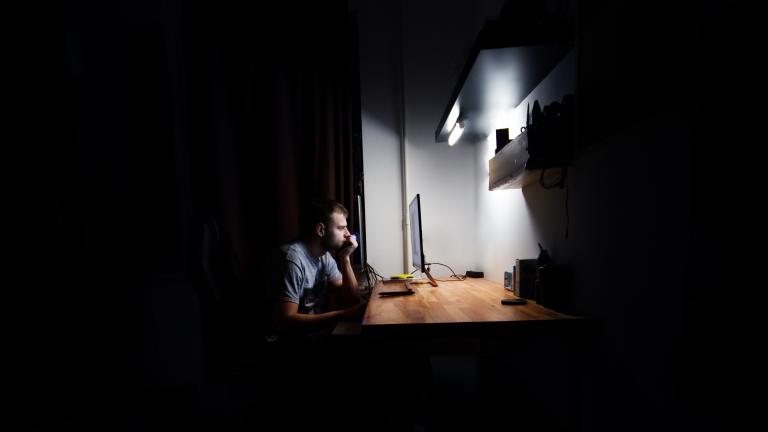
Photo: Adobe Stock
Story text
The "manosphere" refers to a wide variety of men’s groups operating on the internet and offline. Many describe themselves as fighting against progressive (or "woke") ideas about gender equality. Manosphere influencers often assert the unfounded idea that men are naturally dominant. They distort biology and evolution to argue that restrictive gender norms are "natural."[1]
Extremism watchdog groups call this set of ideas "male supremacy."[2] Like white supremacy, male supremacy appeals to men who feel alienated in a changing world. Manosphere influencers promise men support and meaning. But they deny rights and respect to women, trans and nonbinary people. They also advance a narrow idea of masculinity that puts harmful limits on what it means to be a man.
These sexist attitudes can lead to sexual harassment and abuse. At their worst, manosphere groups promote gender‐based violence and celebrate mass murder. In recent years, the manosphere has been growing more popular and more radical.[3] The Canadian Security Intelligence Service now identifies violent misogyny as a form of ideological extremism.[4] In 2020, a young man was – for the first time in Canada – charged with terrorism in a violent attack targeting women.[5]
But manosphere influencers and believers aren’t just weird cultural outsiders. Many of the sexist beliefs that motivate them are all too common in modern society. The manosphere takes everyday biases and magnifies them to misogynist extremes.
What do we mean by “sexism” and “misogyny”?
Sexism: The idea that women, trans and nonbinary folks are inherently inferior to cisgender men.
Misogyny: Hateful or controlling attitudes toward women, trans and nonbinary folks, especially as expressed in harmful prejudices, barriers and behaviours.
The Convention on the Elimination of All Forms of Discrimination against Women (CEDAW) declares: “discrimination against women violates the principles of equality of rights and respect for human dignity, is an obstacle to the participation of women, on equal terms with men, in the political, social, economic and cultural life of their countries, hampers the growth of the prosperity of society and the family and makes more difficult the full development of the potentialities of women in the service of their countries and of humanity."[6]
Put simply, gendered discrimination, harassment and violence are human rights violations.
What motivates the manosphere?
Sexist ideas and organized male bigotry are nothing new. The fight for gender equity has faced backlash from men’s rights activists for decades. They often draw on very real concerns:
- Changes in the global economy have reduced the security and availability of many traditionally “manly” jobs.
- Gains in gender equality and 2SLGBTQI+ rights are challenging and changing traditional ideas about gender roles. Some men find these shifts unsettling. They are dealing with new social expectations. They are being asked to share power and privilege for the first time.
- Men have high (and rising) rates of mental health problems, including loneliness, depression and suicide.
These are all complex issues. They result from decades of political, economic and technological change. But the manosphere blames them all on women.
These groups share a fixation on women and feminism as the cause of men’s personal and social problems. Historian Michael Kimmel calls this emotional reaction “aggrieved entitlement.”[7] It happens when people with power and privilege see improvements in equality and inclusiveness as a loss of status and thus a personal attack on themselves.
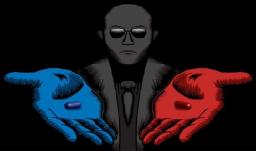
The common claim that there’s a “war on men” ignores most of the social, economic and political forces that affect everyone’s lives, regardless of gender. It also ignores the unequal power and privilege men still enjoy around the world. It amounts to an unfounded conspiracy theory.
Seemingly very different manosphere groups – such as pick‐up artists and misogynist incels – ultimately share similarly misogynist beliefs.
This time of instability and change has given rise to a pervasive belief that gains in rights and power for women must mean men are losing out.
Pick-up artists and “hustle bros”
The pick‐up artist (PUA) world is sometimes called the "seduction community." It includes influencers, companies and forums that teach men how to meet, manipulate and have sex with women. Their tactics include emotional manipulation and physical coercion. Many tacitly encourage date rape and sexual assault.
Through the late 2010s, Roosh V was one of the most famous PUAs in the world. He self‐published a series of sexual tourism books that have been called "guides for rape."[8] His internet forum, Return of Kings, was rife with misogyny, racism and antisemitism. Roosh made headlines in 2015 when he wrote an article about legalizing sexual assault.
Pick‐up artists have given way to “hustle bros” in recent years. These influencers combine misogynist relationship advice with get‐rich‐quick schemes.
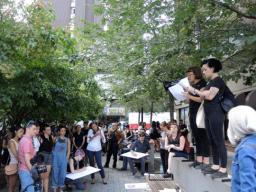
During the COVID‐19 pandemic, Andrew Tate emerged as the latest face of the "hustle bro" manosphere. He was kicked off TikTok, YouTube and other platforms for advocating violence against women. Regardless, videos of him have racked up billions of views. Tate performs and sells a model of hyper‐macho masculinity. His version of male supremacy emphasizes violence, wealth and competitiveness.
Like Roosh and other PUAs, Tate expresses outright hostility towards women. He openly identifies as a misogynist.[10] He denies women’s agency and humanity. He advocates violence against women and downplays the seriousness of sexual assault.[11] In 2022, Romanian police arrested Tate for human trafficking, sexual assault and exploiting women to make pornography.[12] He’s not alone in being accused of gendered criminal acts. Pick‐up artists have been convicted for illegally filming women, rape and threatening women with violence and murder.
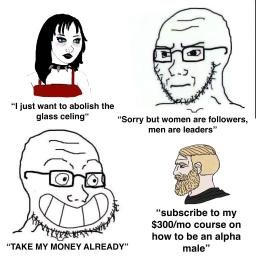
These guys literally make money by taking advantage of the insecurity and inexperience of young men. They sell subscriptions, courses and products. Roosh sold books and workshops. Tate is even more aggressive in exploiting his followers for profit. He created a mentorship site to collect expensive subscription fees. It operates much like a pyramid scheme, rewarding members for recruiting new members.[13]
The "hustle bro" approach to life turns other men into opponents and women into objects. Influencers discourage men from making meaningful social connections and developing healthy emotional lives. Instead, they promote a macho myth of silence and aggression. This can make many of the personal problems that draw men to the manosphere even worse.
The manosphere claims to provide men with tools for professional and sexual success. But the ideas they offer are damaging for both men and the women they treat as targets for conquest and abuse.
Misogynist incels
Incel culture evolved in reaction to the pick‐up artist community. One of the largest early incel forums (since shut down) was PUAhate.com. PUAs believe that learning special techniques will lead to more sexual conquests. In contrast, incels see themselves as doomed to loneliness and misery. This has made incel culture distinctively hateful.
The word "incel" is a contraction of "involuntary celibate." Incels are almost exclusively straight men who have been unsuccessful in finding relationships with women. Many of them discover incel forums and websites while seeking support for their feelings of sadness and alienation. From there, they are drawn into a world of despair and anger.
Incel culture is violently antifeminist and misogynist. Incels often describe women as subhuman objects of desire who are hated and resented because – incels claim – feminism has given women power over sex and romance.
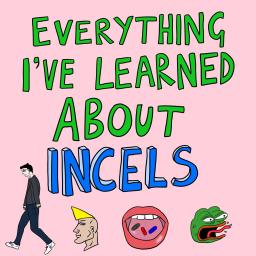
Many incels identify as “black‐pilled,” an intensification of the “red pill” metaphor. They believe that sexual and romantic attraction is purely physical and determined by genetics. And they see themselves as doomed to permanent solitude by their physical appearance. This perspective leads them to feel desperate, inferior and victimized. They often express this in abusive misogynistic rants and violent revenge fantasies online.[14]
Some incels look to their community for mutual support, but many are very cruel to one another. Incel forum comments often include personal attacks and insults. Members routinely encourage one another to die by suicide. And many posts and comments express a desire for revenge against women and society in the form of widespread rape and murder.
A small minority of incels have acted on these violent ideas. Self‐identified incels have killed more than 50 people in Canada and the United States since 2014.[15] There have been at least four incidents of incel murder in Canada. The deadliest was the 2018 “van attack” in Toronto that killed eight women and two men. Many of these murderers explicitly call for a violent incel uprising. They also identify previous incel mass murderers as inspiration. The perpetrators are routinely praised on incel forums and referred to as “saints” to be emulated.

Recruitment and radicalization
Few men set out to become hateful misogynists. They often discover manosphere groups online because they’re looking for help and community. But the algorithms that determine what we see on social media platforms can present users with more and more radical content. Men just looking for support can start encountering increasingly extreme ideas.
It doesn’t take much for someone looking for answers or a sense of belonging to get drawn in. Men are pushed toward fringe groups when they feel rejected and excluded by their peers and mainstream society. Being welcomed and validated by the manosphere is a powerful draw that can set men on the road to radicalization.

The manosphere also actively recruits vulnerable young men. The terms “red pilling” and “black pilling” describe the practice of introducing newcomers to extremist ideas. Male supremacists groom and recruit new followers online, including on bodybuilding forums and gaming livestreams.
Manosphere influencers offer impressive‐sounding pseudoscientific and mythic support for their beliefs. They can be compelling and charismatic. Their conspiratorial messages try to turn feelings of sadness and confusion into anger and aggression. Their logic and solutions are built on the denial of the rights and humanity of women, trans and nonbinary folks. This can lead men to commit harassment, abuse and violence.
Those most powerfully reinforcing rigid and patriarchal gender stereotypes are suffocating those who most need to escape them.
Escaping the manosphere
People do leave these communities, but often with difficulty. In April 2023, a long‐time moderator on an incel forum announced he was resigning his role because he had a girlfriend. The response from the group – his supposed peers – was furious.[16]
At least two Reddit forums – r/IncelExit and r/ExRedPill – support men leaving the manosphere. Former members offer support and conversation to men questioning their misogynist worldviews.[17] Twitch streamers and YouTubers who challenge “Red Pill” myths and beliefs have also offered some men a route out of radicalization.[18] The messenger matters when it comes to talking about identity and misogyny. Former misogynists and other men could and should play an important role in conversations about masculinity, equality and wellbeing.
Researchers have called for a variety of regulatory and technical improvements to reduce the reach and harmfulness of radical, hateful internet content. Simply banning users who engage in hate speech – deplatforming – has been shown to reduce their reach. YouTube adjusted its algorithms in 2019 to reduce radicalization, to mixed success.[19] And all social platforms should offer human‐rights‐affirming content policies supported by robust reporting and blocking tools.

Preventive interventions include school programs addressing gender identities and healthy relationships. These allow boys and young men to explore and express their feelings and experience about what kinds of men they want to grow up to be. They can work through questions, assumptions and myths about masculinity and gender.
Taking action on male supremacy also includes resisting everyday acts of misogyny. Much of male supremacy is different in intensity but not in kind from everyday sexism in Canada. Many popular influencers and pundits sound very similar to the PUA and incel communities when they talk about a strictly defined gender hierarchy based on male dominance. Challenging sexist assumptions helps us recognize and welcome a wider variety of gender and sexual identities. This includes the many and varied ways to be a man.
Traditional masculinity can be a fool’s errand, an effort to live up to standards set by others that leave you feeling empty, friendless.
Freedom from misogyny
The message of male supremacy ranges from dehumanizing objectification to hate speech intended to repress and attack women, trans and nonbinary people. Some men who believe these messages commit crimes as serious as mass murder. Even when things don’t go that far, the false belief that men are inherently superior and dominant leads to everyday harassment and violence. The actions and ideas of the manosphere constrain and threaten women’s lives.[20]
Male supremacist ideas also harm the men who believe them. Men today suffer from an increasing burden of mental illness, including depression and anxiety. Many young men are insecure and lonely but unsure how to ask for help or work through their experiences. The rigid masculine values championed in the manosphere demand they stay independent and stoic at all costs. This leaves them isolated and suffering in silence.[21]
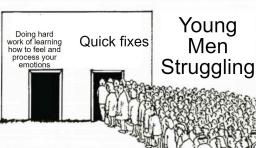
There are alternatives to the manosphere’s bleak and harmful vision of human life as constant competition. The feminist challenge to women’s subordination is also an opportunity for men. As men, we can find freedom, community and identity by escaping the gender stereotypes and traditions that limit us. Men don’t have to find agency and meaning by dehumanizing and controlling others.
Resources
Various programs operate in Canada to offer boys and men tools to develop a healthy sense of self and a good relationship to gender identity. Parents and teachers can also find reports and how‐to guides for talking about gender and misogyny.
- Next Gen Men: https://www.nextgenmen.ca/
- WiseGuyz: https://www.centreforsexuality.ca/programs-services/wiseguyz/
- MANifest change: https://www.manifestchange.ca/
- Healthy Relationships for Youth: https://awrcsasa.ca/prevention-education/healthy-relationships-for-youth-hry-program/
- Empreinte – Agir ensemble contre les agressions à caractère sexuel : http://www.programmeempreinte.com/youth-workshops/
- White Ribbon Campaign: https://www.whiteribbon.ca/
- Moose Hide Campaign: https://moosehidecampaign.ca/
Ask yourself:
How often do I socialize with people of diverse gender and sexual identities?
Who are my role models for gender identity?
Where and how did I learn about gender and sexuality?
References
- One example of many, where an expert addresses simplifications and mistakes in an influencer’s sweeping claims about biology and society: Leonor Gonçalves. “Psychologist Jordan Peterson says lobsters help to explain why human hierarchies exist – do they?” The Conversation. January 24, 2018. https://theconversation.com/psychologist-jordan-peterson-says-lobsters-help-to-explain-why-human-hierarchies-exist-do-they-90489 Back to citation 1
- Southern Poverty Law Center. “Male Supremacy.” https://www.splcenter.org/fighting-hate/extremist-files/ideology/male-supremacy Back to citation 2
- Tanya Basu. “The ‘manosphere’ is getting more toxic as angry men join the incels.” MIT Technology Review. February 20, 2020. https://www.technologyreview.com/2020/02/07/349052/the-manosphere-is-getting-more-toxic-as-angry-men-join-the-incels/ ; Horta Ribeiro, M et al. “The Evolution of the Manosphere across the Web.” Proceedings of the International AAAI Conference on Web and Social Media, 15.1, 196–207. https://doi.org/10.1609/icwsm.v15i1.18053 Back to citation 3
- Canadian Security Intelligence Service. CSIS Public Report 2020. April 2021. https://www.canada.ca/en/security-intelligence-service/corporate/publications/2020-public-report.html Back to citation 4
- CBC News. “Incel‐inspired Toronto massage parlour murder was act of terror, judge rules.” June 6, 2023. https://www.cbc.ca/news/canada/toronto/incel-toronto-massage-killing-terrorism‑1.6867177 Back to citation 5
- United Nations. Convention on the Elimination of All Forms of Discrimination against Women. https://www.ohchr.org/en/instruments-mechanisms/instruments/convention-elimination-all-forms-discrimination-against-women Back to citation 6
- Michael Kimmel. Angry White Men: American Masculinity at the End of an Era. New York: Nation Books, 2013. Back to citation 7
- [Content warning: sexual assault, dehumanizing language, sexually explicit.] David Futrelle. “Are Roosh V’s ‘Bang’ books how‐to guides for rape?” We Hunted the Mammoth. August 15, 2015. https://www.wehuntedthemammoth.com/2015/08/14/are-roosh-vs-bang-books-how-to-guides-for-date-rape/ Back to citation 8
- CBC News, “Roosh V, pickup artist, shouldn’t be allowed in Canada, says petition.” July 14, 2015. https://www.cbc.ca/news/canada/montreal/roosh-v-pickup-artist-shouldn-t-be-allowed-in-canada-says-petition‑1.3166099 Back to citation 9
- Jonah Valdez. “Who is Andrew Tate? Influencer dubbed ‘king of toxic masculinity’ arrested in Romania.” LA Times. December 30, 2022. https://www.latimes.com/entertainment-arts/story/2022–12–30/who-is-andrew-tate-social-media-influencer-arrested-in-romania Back to citation 10
- Lindsay Dodgson. “Andrew Tate's biggest legal challenge will be his own statements on rape and exploitation, lawyer says. There are a lot.” Insider. January 13, 2023. https://www.insider.com/andrew-tate-how-own-statements-now-huge-legal-problem-2023–1 Back to citation 11
- E.J. Dickson. “Leaked Texts Show Andrew Tate’s Alleged Trafficking Tactics.” Rolling Stone. July 25, 2023 https://www.rollingstone.com/culture/culture-features/andrew-tate-coerced-women-sex-work-leaked-texts-1234794138/ Back to citation 12
- Caolán Magee. “I went inside Andrew Tate’s Hustler University – where ‘Gs’ celebrate making $11.” The Independent. January 27, 2023. https://www.independent.co.uk/news/world/europe/andrew-tate-news-hustler-university-prison-b2270271.html Back to citation 13
- Megan Kelly, Alex DiBranco, Dr. Julia R. DeCook. Misogynist Incels and Male Supremacism. New America. February 18, 2021. https://www.newamerica.org/political-reform/reports/misogynist-incels-and-male-supremacism/; Tim Squirrell. “The definitive history of incels: how did they become so violent?” Medium. June 11, 2018 . https://medium.com/@timsquirrell/the-definitive-history-of-incels-how-did-they-become-so-violent-cf83f36376dc Back to citation 14
- Laura Bates. Men Who Hate Women: From Incels to Pickup Artists. Napierville, Ill: Sourcebooks, 2021. Back to citation 15
- Miles Klee. “The ‘LeBron James of Incels’ Swears He Has a Girlfriend Now — He Just Can’t Prove It.” Rolling Stone. April 27, 2023. https://www.rollingstone.com/culture/culture-features/incel-civil-war-girlfriend-komesarj-1234724278/ Back to citation 16
- Sophia Smith Galer. “Could these subreddits save incels?” VICE News. March 22, 2023. https://www.vice.com/en/article/jg5xbg/could-these-subreddits-save-incels Back to citation 17
- Justice Monir Mooghen. Up Next: The Manosphere. YouTube’s Anti‐Feminist Communities’ Power to Radicalise and How to Prevent It. MA Thesis, Aalborg University, 2021; Zoran Bogdanovic. “How I Was Red‐Pilled and Survived It: Three men recount their journeys beyond the lure of radical politics.” VICE News. April 5, 2023. https://www.vice.com/en/article/5d3n4z/red-pill-radicalisation-men-who-overcame-it Back to citation 18
- Kavin Roose. “The Making of a YouTube Radical.” New York Times. June 8, 2019. https://www.nytimes.com/interactive/2019/06/08/technology/youtube-radical.html; Tanya Basu. “YouTube’s algorithm seems to be funneling people to alt‐right videos.” MIT Technology Review. January 29, 2020. https://www.technologyreview.com/2020/01/29/276000/a‑study-of-youtube-comments-shows-how-its-turning-people-onto-the-alt-right/ Back to citation 19
- The connection between misogynist attitudes and violence was well known decades ago. See: Jacquelyn Campbell. “Misogyny and homicide of women.” Advances in Nursing Science, vol. 3 no. 2, 1981, pp. 67–85. doi: 10.1097/00012272–198101000–00007. https://www.nlm.nih.gov/exhibition/confrontingviolence/materials/OB11560.pdf Back to citation 20
- Brian Heilman, Gary Barker, Alexander Harrison. The Man Box: A Study on Being a Young Man in the US, UK, and Mexico. Washington, DC and London: Promundo‐US and Unilever. 2017. https://www.equimundo.org/wp-content/uploads/2017/03/TheManBox-Full-EN-Final-29.03.2017-POSTPRINT.v3-web.pdf Back to citation 21
Suggested citation
Suggested citation : Steve McCullough. “Online misogyny: the “manosphere”.” Canadian Museum for Human Rights. Published September 12, 2023. https://humanrights.ca/story/online-misogyny-manosphere